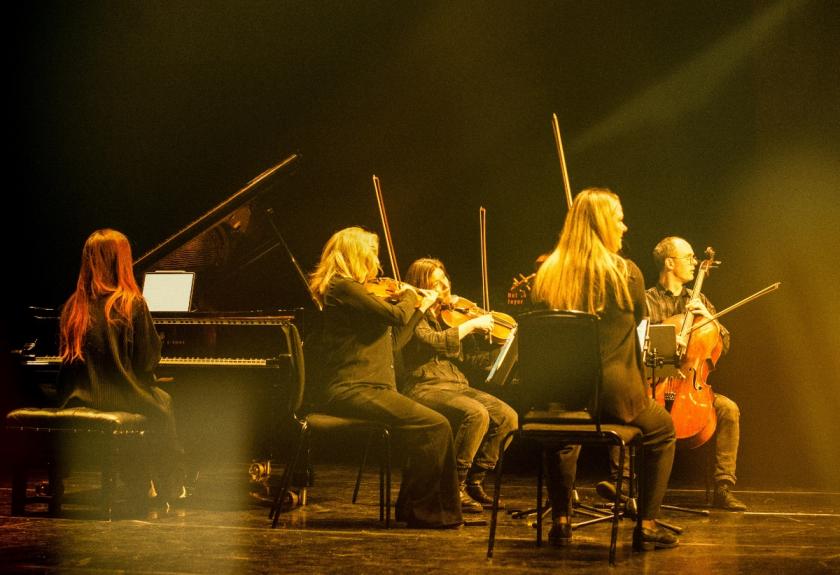When a piece of music is heard for the first time ever, there’s always the delicious hope that, just by being there, an audience might witness something special, to be remembered fondly. It doesn’t happen always, but I think it did for Héloïse Werner’s Hidden Mechanisms, which received its first performance in Manchester last night.
It's strange this should be so, when the ostensible logic behind the piece and its title seems somewhat abstruse. Werner describes the 10-minute, five-section piece for piano quintet as a metaphor for the small, hidden things that underlie an ecosystem – she describes walking in the woods and thinking about things in the trees and under the ground that we don’t see. This translates into music that aims to reveal “processes, mechanics and inner workings”, in “slivers and moments, always partial”.
It also requires performers of some versatility: in addition to a fair range of conventional string sound making (col legno, pizzicato, portamento) and textural effects, they have to use their voices to hiss out audible whispers and their mouths to make percussive sounds; they have to stand up and resume their seats, all the while playing, and make mechanically goonish faces at their audience; the pianist has to pluck the piano strings. Finally, they have to sing as well, and this is where the music creates magic: a slow and melodious piece of instrumental counterpoint leads to a sung melody that steals upon the ear and seems to be the theme that everything else was somehow alluding to.
It seems contrived in many ways – but since the point of the piece is to show things that are often hidden (including the way performers stand up and grin at audiences, sometimes), or at least seem to be purely peripheral, it has a point to make. And then there’s that very beautiful ending.
The quintet playing as Manchester Collective – Eva Thorarinsdottir, Sarah Brandwood-Spencer, Ruth Gibson, Nick Trygstad and Junyan Chen – clearly have abilities that have themselves remained hidden in most of their work until now: they should be congratulated for carrying it off so coolly and attractively.
The programme was one of those that offers its more challenging ingredients first and becomes more fun as its goes on. They began (not playing their music in the sequence advertised, as is often the way with Manchester Collective) with Oliver Leith’s The big house, for string quartet. Leith’s music has been championed by the Collective before: I’m thinking of will o wisp, an intriguing piece for string orchestra presented at the RNCM and elsewhere in December 2022. It had its moments, in terms of playing with conventional instrumental sounds – in The big house there’s a deal more of that. To the uneducated ear it might seem reminiscent of school group violin classes, in other words, people playing out of tune – only here it's deliberate. It takes a lot of skill and concentration to make a semitonal interval bend by 10, 25 or whatever other percentage change is specified.
All seven sections of the work are slow moving, constructed mainly of short motifs, and (despite their individual titles, drawn from a book of thought-provoking photographs of derelict old houses in Ireland), it’s not pictorial music. It’s more experimental in concept and effect, with a wide variety of string playing techniques and chordal textures, and an emphasis on what Ruth Gibson (in a brief introduction) described as “structured discord”. It’s somehow deeply subversive of its own string quartet tradition, and perhaps that’s the point: symbols from the past can lose their authority entirely.
The second part of the evening began with Cassandra Miller’s Leaving, also for string quartet, and having, to the composer, a personal history. It’s got the recognizable sonority of the traditional quartet, employs drone sounds a great deal, and has a harmonic centre that rarely changes; within this there is considerable rhythmic freedom for the individual players, though on this occasion the overall impression was one of stasis, in fact a restful prelude to what was to come.
That was Olli Mustonen’s Piano Quintet. The Collective performed his Nonet no. 2 in 2022, and this new work incorporates the same energetic, spiced-up take on the mainstream classical tradition’s world. The three movements have Italian titles, with the opening Drammatico e passionato drawing surely on memories of the most rhythmically impactful writing of Stravinsky and Shostakovich; the second Quasi una passacaglia presenting an obsessive brief figure (as well as its repeating ground theme), which after a madcap helter-skelter returns in a slow and mysterious reconfiguration; and the third, called simply Finale, beginning with a preludizing build-up, moving into a thoughtful passage where slow wisps of melody are heard against mournful piano chords and a kind of chorale with plaintive punctuation, and then accelerating to a concluding dancing furore.
It's got the capacity to bring any programme to a wildly enthusiastic response at its end, and features a particularly prominent piano part. These players were equal, and responsive, to all its demands. The only surprise was that the audience didn’t applaud more and sooner. But Manchester Collective these days is heard in the august surroundings of a music conservatoire, and people don’t do that in polite circles.














Add comment